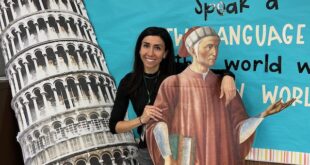
“My father said, ‘No daughter of mine is going out and singing in a heavily male atmosphere,'” recalls M. Stella Weber. My parents were threatening to send me to Italy to become a nun. I was so scared since my mother had a cousin who was a nun. I thought my goose was cooked.”
Instead, Weber took the music in her voice and channeled it into the Italian language, which led to a teaching gig at Main South High School District 207. After 29 years, Weber has seen the program expand from two classes to 13. “Italian at Maine South is the next largest language next to Spanish,” says Weber, who also serves as co-president of the American Association of Teachers of Italian, Midwest Chapter.
Born in Chicago to Sicilian parents, Weber grew up speaking a Sicilian dialect and lived in Sicily for a good chunk of her primary school years, until her family settled down in Elmwood Park. She credits Dorina Spiering, a teacher at Mother Guerin High School, as a key influence. “Through her, I learned what it was to be a dedicated and inspiring person,” she says.
To that end, Weber goes the extra mile to engage her 110 students. She teaches four Italian 2 classes, including an accelerated class, and an Italian 3 accelerated class. Under her tutelage, students get a taste of the culture — literally.
“My colleagues and I will stop at nothing to bring the Italian life to the classroom, whether through nonna’s real biscotti, pizza or anything else that is casalinga,” she says. “The important thing is that my students and I share the same passion for Italian.”
Weber explains how her teaching philosophy evolved: “It came from admiring each of my teachers and professors. They strived to bring a little bit of Italy into the classroom through lectures, slides, movies and countless hours of language lab practice. Now, I bring Italy into the classroom every day.” That might include projects from decorating plain masks shipped from Venice (for Carnevale) to following Italian current events online.
For the past 20 years Weber, has also offered non-school sponsored Italy trips, usually every other year during spring break. “Many people ask me, ‘Don’t you get tired of going to the same places?’ and my response is always, ‘Absolutely not,'” she says. “I get to see Italy through the eyes of a new group of students, many of whom have never been there.” Weber also conducts field trips to the Chicago Opera House, Taylor Street and the National Italian American Sports Hall of Fame.
Through it all, she hasn’t lost a speck of dedication, often honing her lesson plans long before students arrive at school, or after they’ve gone. “Heck, I even wake up in the middle of the night with great ideas,” she says. “My mind never shuts down. I’m always thinking about how to better myself, my students and the subject matter.”
 Fra Noi Embrace Your Inner Italian
Fra Noi Embrace Your Inner Italian






